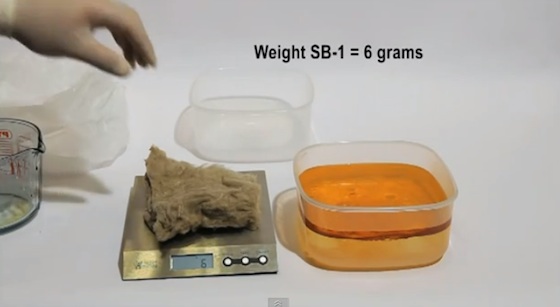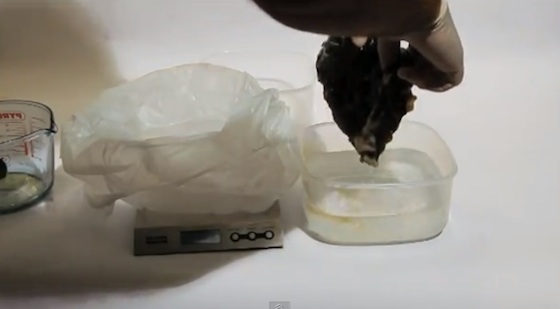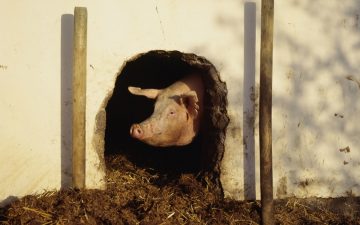
Volcanic basalt is a rock which can be turned into oil-absorbent fibers.
A company named EcoBasalt was founded in Israel in February of 2012. Its founders are leveraging Russian space technology to create a new product for cleaning up oil spills. Their product is named SB-1 and is based on the absorbent properties of basalt. Basalt is a common kind of dark volcanic rock which has been used in everything from the floors of Egyptian pyramids to the insulation of Soyuz spacecraft and now it might help us clean up oil spills.
 Ecobasalt fabric before sucking up oil
Ecobasalt fabric before sucking up oil
More than 70,000 barrels of oil are produced every day and all of it must be transported to the consumers. We hear about the spectacularly large oil spills which occur at the well-head or aboard supertankers, but given the amount of oil produced and consumed every day, spills along the entire supply chain are inevitable. Therefore, oil spill containment is an important problem to solve.

Ecobasalt after sucking up oil
In the case of BP’s Deepwater Horizon oil spill and Egypt’s Jebel al-Zayt oil spill, chemical dispersants worked quickly to sweep some of the long-term problems beneath the waves where they won’t effect this quarter’s stock prices, but the cosmetic application of millions of gallons of toxic dispersants may cause more long-term damage than the oil-spill they were intended to cure.
[youtube]http://www.youtube.com/watch?v=eGGkWIIreCA[/youtube]
Clay, sand, oil-based synthetics and even human hair can be used to absorb oil spills, but EcoBasalt’s SB-1 basalt fibers have some advantages. EcoBasalt’s tests show that one gram of SB-1 can absorb up to 72 grams of oil, at least twice as much as typical carbon-based absorbants and it can do it faster.
SB-1 is a non-toxic, natural, fire, alkali and acid-resistant substance, so it is possible to burn absorbed oil without extracting it from the basalt. Extraction is also possible by simply compressing the SB-1 and as a third alternative, SB-1 can be mixed with asphalt and used in road construction
Robert Barzelay, the CEO of EcoBasalt tells Green Prophet that the product has not yet been tested on oil spills.
He says: “We have developed an oil sorbent made of basalt fibers. It has been a result of decades of R&D, and years of testing. It has been tested and proven (by independent labs in the USA and Israel) to perform far better than anything else on the market. Plus it is non-toxic, constitutes no health hazards, is ecofriendly, and the removed oil, can be recuperated from the sorbent, whereafter the sorbent can be recycled in asphalt for roads.
“There is nothing like it on the market.”
“At the moment we are at the stage to design oil sorbent booms with our basalt fiber sorbent material. In addition, we are in the process of setting up our own production lines. Once the end-product (oil boom) has been developed and produced, it will be tested by OHMSETT in the USA, and by (at least) ten oil and gas companies and so-called oil spill responders, companies and organizations that contain oil spills and do the cleanup.”
Image of lizard on volcanic rock from Shutterstock



